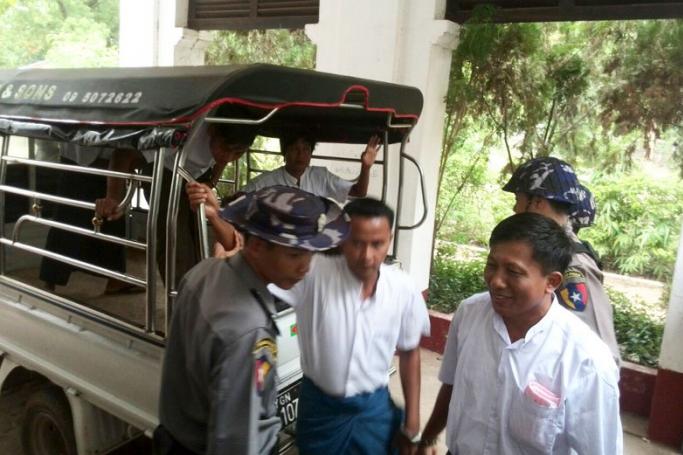In a statement issued on 3 May 2015, International Press Freedom Day, Amnesty International has called on the Myanmar authorities to ‘immediately and unconditionally release all media workers imprisoned in connection with their peaceful journalistic activities.’
According to the statement: ‘At least 12 media workers in Myanmar will spend World Press Freedom Day in jail. Amnesty International considers them all prisoners of conscience, detained solely for the peaceful exercise of their right to freedom of expression and other human rights.’
The statement highlights the case of five Unity newspaper journalists: Lu Maw Naing, Yarzar Oo, Paing Thet Kyaw, Sithu Soe and Tint San who were each sentenced to 10 years in prison with hard labour under Myanmar’s Official Secrets Act in july 2014 which was later reduced to seven years on appeal. The five were arrested after the newspaper published an article on an alleged chemical weapons factory in January 2014. According to state media the five were charged with ‘disclosing State secrets, trespassing on the restricted area of the factory, taking photographs and the act of abetting.’
The statement points out:‘The Unity workers join at least seven other journalists and media workers currently behind bars who have been sentenced to imprisonment in the past year. They include five media workers from the Bi-Midday Sun newspaper who are each serving two years in prison for publishing false claims that opposition leader Aung San Suu Kyi and ethnic leaders had been elected as an interim government. In March this year, two media workers from the Myanmar Post Weekly were each sentenced to two months’ imprisonment for criminal defamation after being accused of misrepresenting a military member of parliament’s speech in a headline.‘
Amnesty International also notes that: ‘Wide-ranging political, economic and political reforms since 2011 have seen the emergence of a vibrant media environment in Myanmar. However, the authorities are undermining this environment by harassing and imprisoning journalists who dare to report on topics considered ‘sensitive’ by the government or military.’
They continue : ‘Amnesty International is also calling for an end to the threats, harassment and other forms of intimidation faced by journalists in Myanmar as a result of their work. This is not only impeding their ability to undertake their important work – it has also created a chilling environment for free speech and critical voices ahead of key elections later this year’
And that: ‘The Myanmar authorities should also ensure that journalists and other media workers are able to peacefully exercise their right to freedom of expression and carry out their journalistic activities, including reporting on public events, such as protests and demonstrations, without fear of reprisal or arrest. ‘
The Human Rights organisation also called on the Myanmar government to ratify the International Covenant on Civil and Political Rightsand incorporate them into domestic law.
You are viewing the old site.
Please update your bookmark to https://eng.mizzima.com.
Mizzima Weekly Magazine Issue...
14 December 2023
Spring Revolution Daily News f...
13 December 2023
New UK Burma sanctions welcome...
13 December 2023
Spring Revolution Daily News f...
12 December 2023
Spring Revolution Daily News f...
11 December 2023
Spring Revolution Daily News f...
08 December 2023
Spring Revolution Daily News f...
07 December 2023
Diaspora journalists increasin...
07 December 2023
PPP candidate interested in extracting resources from mountains east of Pyinmana












